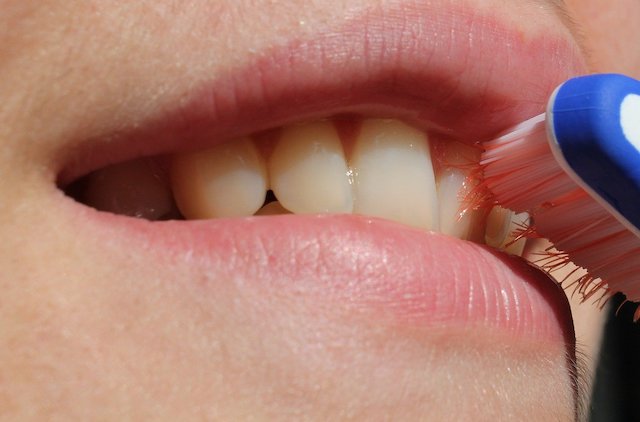When you have an orthodontic device like metal braces, maintaining good oral hygiene can be a little more complicated. Wearers may be worried about bad breath and plaque build-up more than ever before, and it’s all for a good reason.
Braces can make it challenging to keep your pearly whites clean. What is more, you have to be more cautious not to damage your braces when eating and engaging in daily hygiene routines. So, how do you maintain good dental hygiene while wearing braces? Here’s an easy and useful guide to help you keep in tune with your oral health as a braces wearer.

Avoid sticky or hard foods
One of the number one evils when wearing braces is consuming hard or sticky foods. Not only can these potentially damage your braces, but they can also get lodged around brackets and behind wires, increasing your chances of developing cavities.
If you must consume something hard or sticky, always make sure to clean your teeth thoroughly afterward. If part of your braces breaks after consuming such food, consult your orthodontist immediately to prevent pain, gum irritation, risk of oral infection, chances of swallowing or choking on braces parts, and delayed results in your orthodontic treatment.
Brush after every meal
It’s a general guideline to brush after each meal, or at the bare minimum, twice a day. Unfortunately, most people don’t stick to this rule or find it difficult to. When wearing braces, however, it’s even more crucial to follow this advice.
Brushing after each meal, especially after consuming something sugary or messy, can limit the time that debris is stuck not just within the crevices of your teeth but also within wires and brackets, which can otherwise lead to bad breath and cavities.
Use a water flosser
Using traditional dental floss when wearing braces can be difficult and is not recommended. Instead, orthodontists typically recommend the use of a water flosser. This device uses water pressure to get rid of food particles and debris from between the teeth. Ultimately, using a water flosser after each meal can reduce your risk of cavities. According to this dentist in Saratoga Springs, the adjustable pressure settings on these devices also provide a gentle massage to the gum tissue, which can help stimulate blood flow and reduce inflammation often caused by orthodontic appliances.
Clean between your brackets with an interdental brush
Also known as interproximal brushes, interdental brushes are special tools with soft bristles designed to help braces wearers floss under metal wires and around brackets. Getting rid of trapped food particles can reduce bad breath, bacteria build-up, and future cavity development.
When combined with a water floss, interdental brushes can essentially serve the same purpose for braces wearers as regular floss does for non-braces wearers, if not better.
Swap your toothbrush out regularly
Dental professionals always recommend changing out your toothbrush regularly. However, how often do we really do this? While it might seem wasteful, swapping out your brush every so often is important, especially for those wearing braces.
Your toothbrush’s bristles should be in good condition to provide a proper clean. This means bristles will be straight and full rather than frayed, worn, or balding. Changing it out can also ensure cleaner bristles, which won’t spread bacteria back to your teeth when brushing them.
Use mouthwash daily
Mouthwash is more than just a bad breath deterrent. It can also help dislodge food debris from the teeth and kill excess bacteria in the mouth. In turn, this can help reduce plaque, lower one’s risk of gum disease, protect against cavities, and may even aid with whitening the teeth.
Using mouthwash is especially critical when wearing braces. Because brackets and wires cover the teeth, more gunk hides on and within the teeth. It’s also generally harder to clean when wearing braces, so the addition of mouthwash can certainly help oral health-wise.
Stay hydrated
It may not sound like an oral hygiene tip, but staying hydrated matters more to your dental health than you might think. Drinking plenty of water is especially useful for those with metal braces.
For one, water prevents dry mouth. A well-hydrated mouth helps deter bacteria, which can otherwise lead to excessive bacterial build-up. The act of having water in your mouth alone can also help wash away sugars and food debris in the mouth and within the teeth, reducing the potential of harmful tartar and plaque.
Keep going to your regular dental visits
Getting orthodontic treatment doesn’t mean dental visits are no longer necessary. Dentists and hygienists see dozens of patients a week with orthodontic devices. Just like with patients without braces, these professionals are skilled when it comes to observing and cleaning the teeth and gums of braces wearers, as well as providing any necessary diagnoses.
That said, make sure to stick to your regular dental visits twice a year, or more if your dentist advises. If you ever have concerns regarding oral pain, swelling, or other concerns, visit your dentist right away. Letting an oral concern continue for too long can be detrimental to the state of your oral health, as well as your orthodontic treatment.
Don’t skip your orthodontic appointments
Skipping one or a few orthodontic appointments might not seem like a big deal. However, because these appointments only occur every one to two months, missing one appointment can make all the difference and not in a good way.
Missing a visit can not only prolong your treatment, but your oral health may also decline during that time. When an orthodontist isn’t able to examine your teeth, visible signs of cavities, tartar or plaque build-up, and tooth discolouration may be overlooked by the braces wearer and not get corrected in a timely manner.
All in all, keeping up with your Park Orthodontics Glasgow appointments, getting to your appointments on time, and rescheduling as far in advance as possible, as needed, can ensure the best success with your orthodontic treatment.
Keeping your teeth white, free of debris, clear of cavities, and without plaque and tartar requires regular maintenance. It gets a bit more challenging when you’re wearing metal braces. The good news is, there are special guidelines to follow to maintain good oral health, all while preventing damage to your braces.

Monica Costa founded London Mums in September 2006 after her son Diego’s birth together with a group of mothers who felt the need of meeting up regularly to share the challenges and joys of motherhood in metropolitan and multicultural London. London Mums is the FREE and independent peer support group for mums and mumpreneurs based in London https://www.londonmumsmagazine.com and you can connect on Twitter @londonmums


